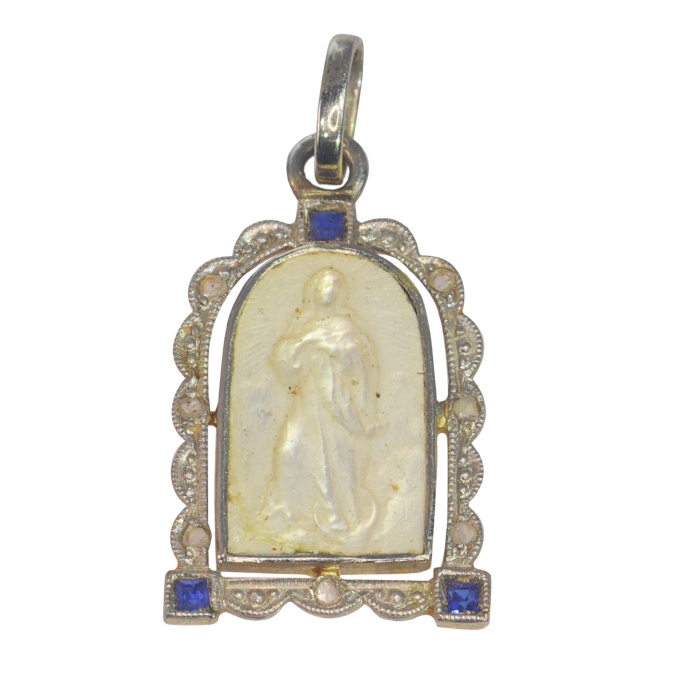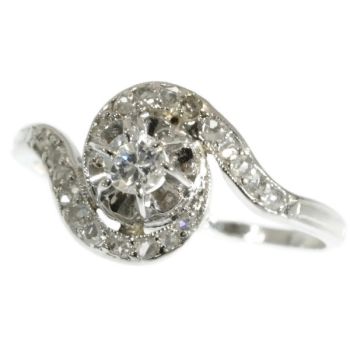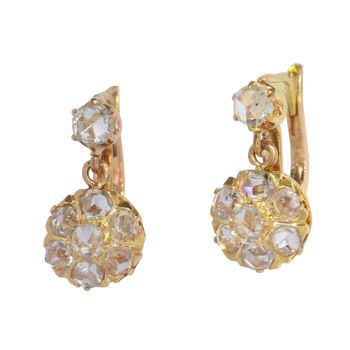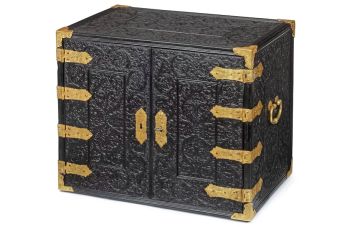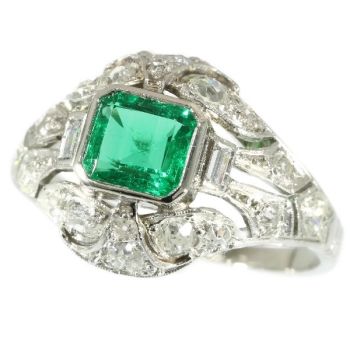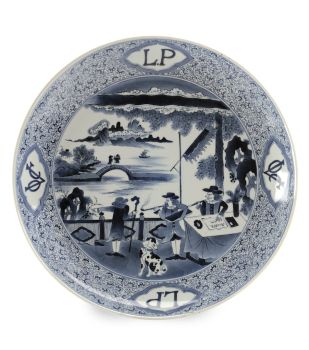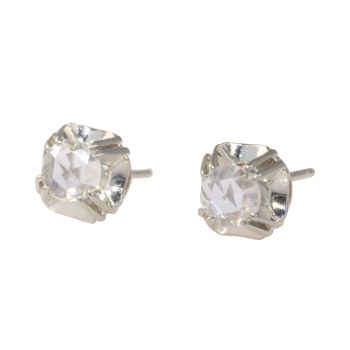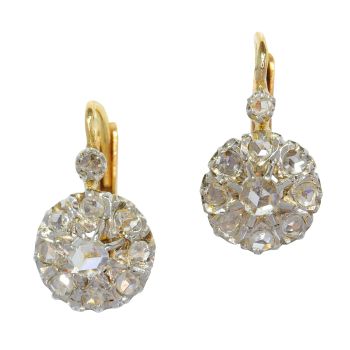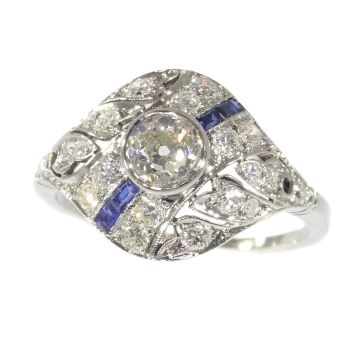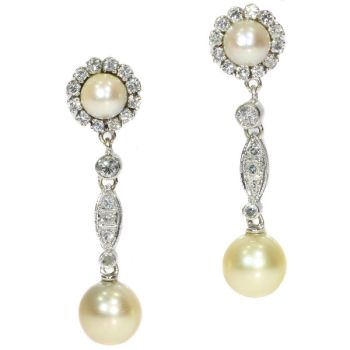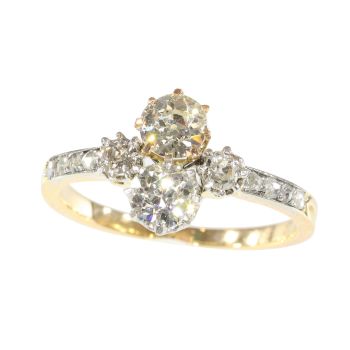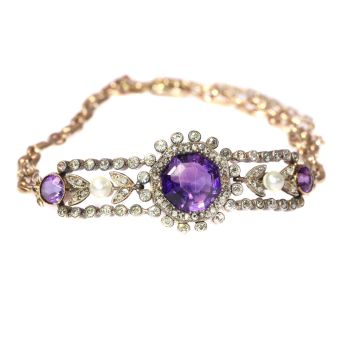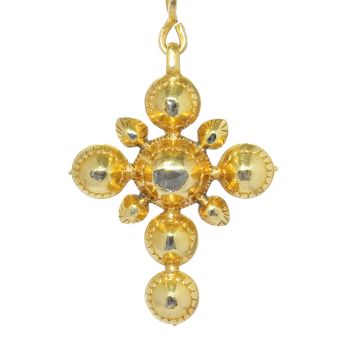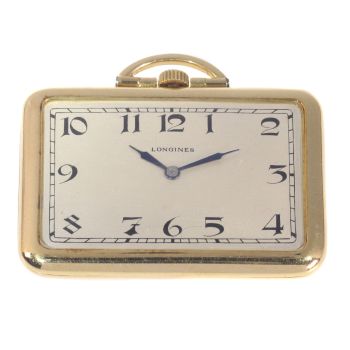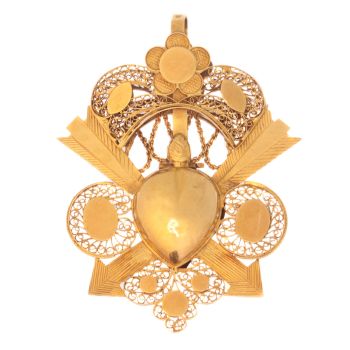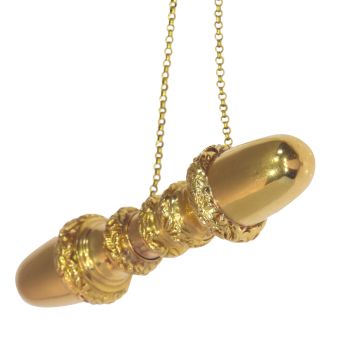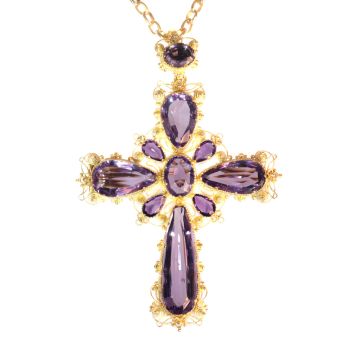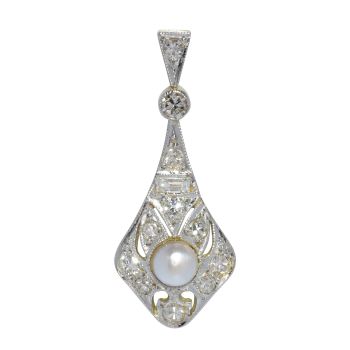Vintage 1910's Edwardian - Art Deco 18K pendant Mother Mary medal in mother-of-pearl set with diamo 1910
Artiste Inconnu
€ 850
Adin Fine Antique Jewellery
- Sur l'oeuvre d'art
Antique jewelry object group
pendant
Condition
very good condition
more info on our condition scale
Country of origin
unknown
Style
Between Edwardian and Art Deco - The Edwardian era or Edwardian period in the United Kingdom is the period covering the reign of King Edward VII, 1901 to 1910. The death of Queen Victoria in January 1901 and the succession of her son, Edward, marked the start of a new century and the end of the Victorian era. While Victoria had shunned society, Edward was the leader of a fashionable elite which set a style influenced by the art and fashions of continental Europe—perhaps because of the King's fondness for travel. The era was marked by significant shifts in politics as sections of society which had been largely excluded from wielding power in the past, such as common labourers and women, became increasingly politicised. Art Deco is an eclectic artistic and design style which had its origins in Paris in the first decades of the 20th century. The style originated in the 1920s and continued to be employed until after World War II. The term "art deco" first saw wide use after an exhibition in 1966, referring to the 1925 Exposition Internationale des Arts Décoratifs et Industriels Modernes that was the culmination of high-end style modern in Paris. Led by the best designers in the decorative arts such as fashion, and interior design, Art Deco affected all areas of design throughout the 1920s and 1930s, including architecture and industrial design, as well as the visual arts such as painting, the graphic arts and film. At the time, this style was seen as elegant, glamorous, functional and modern.
See also: Edwardian and Art Deco
more info on styles
Style specifics
As for its elegant design, this jewel has the finesse of an Edwardian piece reacting gracefully against the very geometrical forms of Art Deco that was strongly influenced by Cubism. However, because both Edwardian and Art Deco styles were contemporaries of each other, we sometimes notice pieces - like this one - that carry both influences.
Period
ca. 1910
Events & facts of this era, poetry of this era, fashion of this era.
Source of inspiration
Christianity
Theme
Mother Mary
Material
Two tones of precious metal, the main part being 18K yellow gold and the white parts are either white gold or platinum. (touchstone tested)
more info on precious metals
Diamonds
Seven senailles. A senaille is a simplified rose cut diamond, a small diamond chip with perhaps a few polished facets. We do not have the weight of these diamonds which is normal in our trade when it comes to senailles.
All diamonds we offer are screened by the I.J.G.C. for whether they are natural or synthetic, and all diamonds in this jewel are 100% guaranteed to be natural.
Precious stones
Three sapphires. We did not check if the sapphires are lab produced or not as this information has no influence on the value of this jewel. Natural sapphires and lab produced sapphires were both used in this era, rather more for their effect than for their intrinsic value.
One plate of mother-of-pearl
Birthstones
Diamond is the birthstone (or month stone) for April and sapphire for September.
more info on birthstones
Hallmarks
"18" indicating 18K gold
more info on hallmarks
Dimensions
1,94 cm (0,76 inch) x 0,98 cm (0,39 inch)
see picture with a ruler in millimeters and inches
Weight
0,80 gram (0,51 dwt)
Adin Reference Nº
23191-0415
Copyright photography
Adin, fine antique jewellery
Additional information
our latest acquisitions
jewelry glossary
wall of fame
visit us in Antwerp
subscribe to our mailinglist
- Sur l'artiste
Il peut arriver qu'un artiste ou un créateur soit inconnu.
Certaines œuvres ne doivent pas être déterminées par qui elles sont faites ou elles sont faites par (un groupe d') artisans. Les exemples sont des statues de l'Antiquité, des meubles, des miroirs ou des signatures qui ne sont pas claires ou lisibles, mais aussi certaines œuvres ne sont pas signées du tout.
Vous pouvez également trouver la description suivante :
•"Attribué à …." A leur avis probablement une oeuvre de l'artiste, au moins en partie
•« Atelier de …. ou « Atelier de » À leur avis, une œuvre exécutée dans l'atelier ou l'atelier de l'artiste, éventuellement sous sa direction
•« Cercle de… ». A leur avis une oeuvre de la période de l'artiste témoignant de son influence, étroitement associée à l'artiste mais pas forcément son élève
•« Style de … ». ou "Suiveur de ...." Selon eux, une œuvre exécutée dans le style de l'artiste mais pas nécessairement par un élève ; peut être contemporain ou presque contemporain
•« Manière de… ». A leur avis une oeuvre dans le style de l'artiste mais d'une date plus tardive
•"Après …." A leur avis une copie (quelle qu'en soit la date) d'une oeuvre de l'artiste
•« Signé… », « Daté… ». ou « Inscrit » À leur avis, l'œuvre a été signée/datée/inscrite par l'artiste. L'ajout d'un point d'interrogation indique un élément de doute
• "Avec signature ….", "Avec date ….", "Avec inscription …." ou "Porte signature/date/inscription" à leur avis la signature/date/inscription a été ajoutée par quelqu'un d'autre que l'artiste
Êtes-vous intéressé par l'achat de cette oeuvre?
Related artworks
Unknown artist
A Japanese bronze Hu flower vase, Edo / Meiji, 19th century19th century
Price on requestMenken Works of Art
1 - 4 / 12- 1 - 4 / 12

